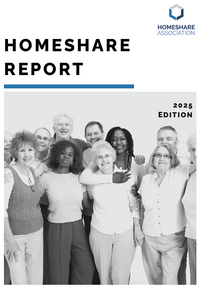The Homeshare Association has published its latest Homeshare Report 2025 which reveals an invaluable insight into the key factors that are steering a growing interest in homeshare arrangements. Dementia, loneliness and social isolation, and overnight security concerns are among the key primary drivers for intergenerational living of this type.
Whilst there is often more than one driver for seeking a homeshare arrangement, the annual report identifies the primary drivers for seeking a homeshare arrangement as overnight security (75%), loneliness/social isolation/bereavement (58%), with dementia (43%), and mobility issues (43%) ranking the same. Other factors include difficulties completing day-to-day tasks (35%), and long-term health conditions (22%).

With falls being one of the most serious risks that older people face when living alone, the report also noted that householders who had a history of falls prior to starting a homeshare, have reduced the frequency of falls by 29%, and 85% stated that they feel more secure.
The Homeshare Association strengthens collaborations between the homeshare market and the health and social care sector, promoting the homeshare movement in the UK and the Republic of Ireland. Homeshare is a person-centred and bespoke arrangement; an adaptable model that can be tailored to most people’s needs. It is also one of the most affordable options for supporting our ageing population to remain living independently in their own homes. It sees older people (householders) sharing their home with younger people (homesharers) who provide a helping hand around the home, as well as companionship, in exchange for an affordable place to live.
The report also cites that 52% of homesharers provided assistance to their householder in an emergency situation, demonstrating the value of having this type of live-in support. 85% of householders felt more comfortable and secure in their home since homesharing, compared to before, and 80% felt that homeshare provides peace of mind.
The average age of a householder according to data from the Homeshare Association, is 83 years, and the oldest is 104 years. The average age of a homesharer is 40, and the youngest is 21.
Younger people benefit significantly from homeshare arrangements too. 61.5% of homesharers stated that homesharing has provided greater financial security offering affordable accommodation and helping them to save money. Meanwhile, 55% of homesharers stated that homesharing has reduced their loneliness and given them a friend, plus the fulfilment of supporting someone else.
Furthermore, the report showed a 41% decrease in householder hospital admissions/GP appointments (other than routine) since having a homesharer.
Amanda Clarke, from Share and Care Homeshare, founding member and chair of the Homeshare Association said, “By encouraging older people to embrace homesharing, their quality of life can improve, and as our report highlights, homesharing is a preventative solution to reduce healthcare costs, and improve the overall wellbeing and safety of our growing older population. Homesharing is transforming lives, and we are very much looking forward to building connections further across the health and social care sector to continue supporting older people to live independently in their own homes.”
For the full Homeshare Report 2025, please visit https://homeshareassociation.o... If you are working with someone who could benefit from a homeshare arrangement, please contact the Homeshare Association at [email protected]

